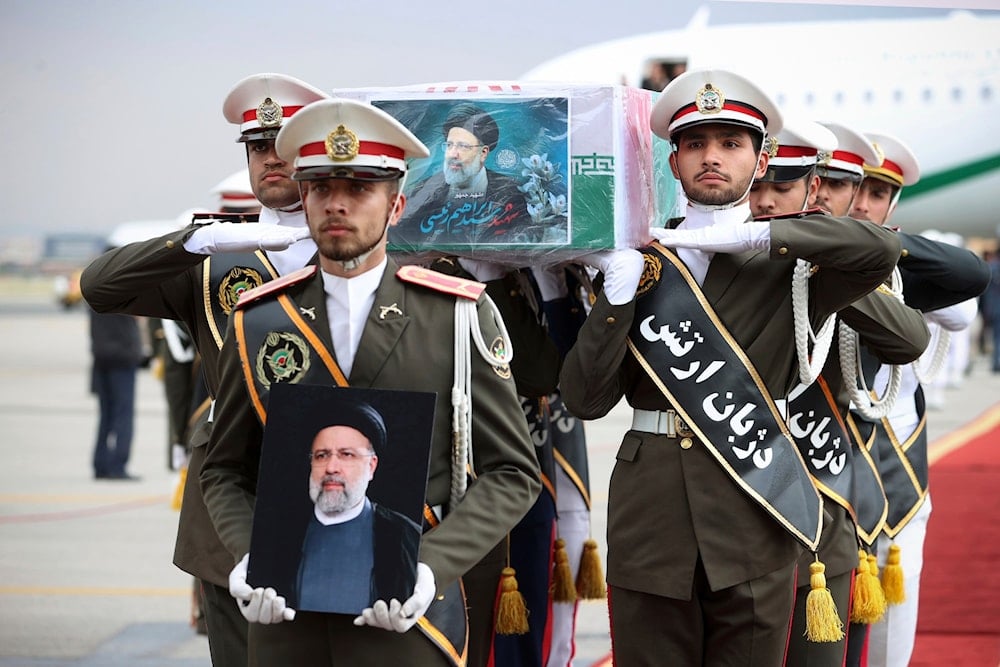Leaders at Raisi funeral clear proof Iran not isolated in face of West
The foreign ministers of Saudi Arabia, the United Arab Emirates, and Bahrain are seen mere footsteps away from the leaders of the Lebanese, Yemeni, and Palestinian Resistance
-

Army members carry the flag-draped coffin of President Ebrahim Raisi during a funeral ceremony at Mehrabad airport in Tehran, Iran, Tuesday, May 21, 2024. (Iranian Presidency Office/AP)
The funeral of late Iranian President Ebrahim Raisi on Wednesday was a scene of union between Arab top diplomats, displaying the undeniable role of tie reparations in the region with major Arab countries even if they remain vital US allies.
The list of foreign officials who attended the funeral on Wednesday stood as clear proof as to just how much Iran’s efforts to blunt US sanctions have paid off.
The foreign ministers of Saudi Arabia, the United Arab Emirates, and Bahrain were mere footsteps away from the leaders of the Lebanese and Palestinian Resistance, Yemen's Ansar Allah, and Afghanistan’s Taliban, in addition to Russian President Vladimir Putin's former aide.
Meanwhile, the Tunisian President visited Iran for the first time since the Islamic Republic came into being to attend the funeral, and rare appearances were made by the foreign ministers of Jordan and Egypt.
Officials from Qatar, Iraq, Pakistan, Azerbaijan, Belarus, Uzbekistan, and many others also attended.
Swimming against the current, the US State Department released a statement expressing its "official condolences" over the death of Raisi, and Secretary of State Antony Blinken in congressional testimony said, "Bearing in mind the horrific acts in which he was involved as a judge and president, and the fact that he cannot be involved in them in the slightest, yes, the Iranian people are probably better off," in response to a question, before adding, "We are definitely not grieving over his death."
Read next: Ebrahim Raisi, a pillar against Western hegemony
Social media users worldwide have taken en masse to relevant platforms, refuting a Western media narrative suggesting a subdued response within Iran to the recent tragic loss of Raisi and his companions.
Raisi, alongside Foreign Minister Hossein Amir-Abdollahian and others, tragically died in a helicopter crash on Sunday while en route to Tabriz. Following the accident, millions gathered for funeral processions all over Iran from Tabriz to Qom and Tehran.
After the announcement of Raisi's death, footage showcased millions marching, mournful, paying heartfelt tribute, and chanting their support for what they regarded as a martyr of duty and a prominent leader. The scenes mirrored the profound impact of the loss on the Iranian nation.
Mainstream Western media outlets quickly reacted with a series of misreports and downplays, aiming to diminish the profound sorrow that engulfed Iran following the tragic incident. Meanwhile, social media users vehemently opposed the Western media's narrative, sharing photos and videos of the grieving nation flooding the streets to mourn their beloved President's passing.
This especially coincides with a meeting held between Resistance factions and the chief of the Islamic Revolution Guard Corps (IRGC) Major General Hossein Salami and the IRGC Quds Force Commander Brigadier General Esmail Qaani on the sidelines of the funeral ceremony, Al Mayadeen's correspondent in Tehran reported.
The Resistance factions comprised Hamas, the Islamic Jihad Movement, the Popular Front for the Liberation of Palestine (PFLP), Hezbollah, Ansar Allah in Yemen, and the Islamic Resistance in Iraq.
In the meeting, the political, social, and military conditions in Gaza, Operation Al-Aqsa Flood, and the role of the Axis of Resistance amid the ongoing Israeli genocide in the Strip were discussed. The attendees stressed the importance of the continuation of freedom fighting and struggle in cooperation between all the Resistance factions in the region until the Palestinian Resistance emerges victorious.

 4 Min Read
4 Min Read








